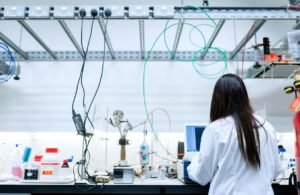Artificial Intelligence Applications
Artificial Intelligence (AI) has become a transformative technology across various industries, enabling machines to simulate human intelligence and perform tasks that traditionally required human intervention. With advancements in machine learning, natural language processing, and computer vision, AI applications are rapidly expanding, offering solutions that enhance efficiency, accuracy, and decision-making.
Key Takeaways:
- Artificial Intelligence (AI) mimics human intelligence to perform complex tasks.
- AI applications enhance efficiency, accuracy, and decision-making.
- Machine learning, natural language processing, and computer vision are key components of AI.
AI Applications in Different Industries
A wide range of industries are leveraging AI applications to streamline operations, reduce costs, and improve customer experiences. **Healthcare**, for instance, benefits from AI-powered diagnosis, drug discovery, and personalized treatment plans. **Finance** utilizes AI to detect fraud, provide personalized financial advice, and automate trading. **Manufacturing** integrates AI for predictive maintenance, quality control, and supply chain optimization.
*AI-driven healthcare solutions can significantly improve patient outcomes and reduce medical errors.*
Furthermore, **retail** implements AI for inventory management, demand forecasting, and personalized shopping recommendations based on consumer behavior analysis. **Transportation** industry benefits from AI algorithms for autonomous vehicles, route optimization, and traffic prediction. **Education** utilizes AI to enhance personalized learning, create interactive learning environments, and provide educational assistance.
*AI-powered transportation systems can revolutionize the way people and goods move, reducing accidents and congestion.*
Three Examples of AI Applications
| AI Application | Industry | Benefits |
|---|---|---|
| Chatbots and virtual assistants | Customer service | 24/7 support, reduced wait times, personalized interactions |
| AI-powered recommendation systems | E-commerce | Increased sales, improved customer satisfaction, personalized shopping experiences |
| AI-driven predictive maintenance | Manufacturing | Reduced downtime, optimized maintenance schedules, improved productivity |
The Future of AI
Artificial Intelligence continues to evolve rapidly, opening the door for further advancements and novel applications. As AI technologies become more sophisticated, their potential impact on society increases. From autonomous vehicles to personalized medicine, AI-driven innovations have the potential to revolutionize various aspects of our lives.
*The integration of AI and IoT technologies can create a world where objects communicate and interact intelligently.*
However, ethical considerations, data privacy, and job displacement concerns need to be carefully addressed to ensure responsible deployment of AI. Ongoing research and collaboration between academia, industry, and policymakers will shape the future development and implementation of AI technologies.
AI Applications Fueling the Future
- Autonomous vehicles transforming transportation systems.
- Personalized medicine revolutionizing healthcare.
- AI-assisted decision-making optimizing business processes.
The Potential of AI is Limitless
Artificial Intelligence has already demonstrated its transformative potential across many industries, opening up new possibilities and opportunities. Whether it’s revolutionizing healthcare, enhancing customer experiences, or improving efficiency in manufacturing, AI applications continue to evolve and shape the future of our society. The advancements in AI will undoubtedly contribute to solving complex challenges, improving decision-making, and transforming various facets of our lives.

Common Misconceptions
Misconception 1: Artificial intelligence can replace human jobs completely
One common misconception about artificial intelligence is that it will completely replace human jobs. While AI has the potential to automate certain tasks and improve efficiency in many industries, it is unlikely to completely replace human workers.
- AI is more likely to supplement and enhance human roles rather than replace them
- Jobs that require complex decision-making, creativity, and empathy are less likely to be automated
- AI technology will create new job opportunities in fields such as data analysis and AI programming
Misconception 2: Artificial intelligence is always smart and accurate
Another misconception is that artificial intelligence systems are always smart and accurate. While AI can perform certain tasks with remarkable accuracy, it is not infallible and can make mistakes.
- AI systems are only as good as the data they are trained on, which means biases and errors can be present
- AI algorithms can struggle with novel or ambiguous situations that they have not been trained for
- AI can be susceptible to adversarial attacks and manipulations, leading to incorrect outcomes
Misconception 3: Artificial intelligence is a singular entity
Many people have the misconception that artificial intelligence is a singular entity with its own consciousness. In reality, AI is a broad field that encompasses various technologies and approaches to mimic human intelligence.
- AI is made up of subsets such as machine learning, natural language processing, and robotics
- Different AI systems are designed for specific tasks and do not possess a general intelligence or consciousness
- AI operates based on predefined algorithms and rules rather than independent decision-making abilities
Misconception 4: Artificial intelligence is all about futuristic robots
When people think of artificial intelligence, they often imagine futuristic robots performing complex tasks. However, AI applications extend beyond robotic systems and exist in various forms that are already prevalent in our daily lives.
- AI powers voice assistants like Siri and Alexa
- AI is utilized in recommendation systems for personalized online content
- AI is used in autonomous vehicles, fraud detection systems, and healthcare diagnostics
Misconception 5: Artificial intelligence is only for large enterprises
Lastly, there is a misconception that artificial intelligence is only accessible and applicable to large enterprises with significant resources. However, AI technology has become increasingly accessible and scalable, allowing businesses of all sizes to benefit from its applications.
- There are AI tools and platforms that cater to small and medium-sized businesses
- Cloud-based AI services make it easier and more affordable for businesses to adopt AI solutions
- AI technology has the potential to level the playing field and provide competitive advantages to smaller organizations

Applications of Artificial Intelligence in Healthcare
Artificial Intelligence (AI) is revolutionizing the healthcare industry by improving patient care, enabling personalized medicine, and streamlining operations. The following table highlights some key applications of AI in healthcare.
| Application | Description |
|---|---|
| Medical Diagnosis | AI algorithms can analyze medical images, such as X-rays and MRI scans, to assist in the diagnosis of diseases. |
| Drug Discovery | AI can speed up the drug discovery process by analyzing massive amounts of biomedical data, identifying potential targets, and predicting drug efficacy. |
| Personalized Treatment | AI algorithms can analyze patient data and genetic information to personalize treatment plans and predict treatment outcomes. |
| Virtual Nursing Assistants | AI-powered virtual assistants can provide patients with personalized healthcare information, reminders, and support. |
AI in E-commerce
Artificial Intelligence is transforming the way we shop online by enhancing customer experiences, enabling personalized recommendations, and optimizing supply chain operations. The following table showcases notable AI applications in e-commerce.
| Application | Description |
|---|---|
| Chatbots | AI-powered chatbots assist customers in finding products, answering queries, and providing recommendations. |
| Product Recommendation Systems | AI algorithms analyze user behavior and preferences to suggest relevant products, increasing conversion rates. |
| Fraud Detection | AI can detect fraudulent activities by analyzing transaction patterns, reducing financial losses for e-commerce businesses. |
| Inventory Management | AI algorithms optimize inventory levels and predict demand, reducing overstocking and out-of-stock situations. |
AI Applications in Autonomous Vehicles
Artificial Intelligence plays a crucial role in the development of autonomous vehicles, enabling advanced perception, decision-making, and navigation capabilities. The table below illustrates key AI applications in the field of autonomous vehicles.
| Application | Description |
|---|---|
| Object Detection | AI algorithms analyze sensor data to detect and track objects such as pedestrians, vehicles, and traffic signs. |
| Path Planning | AI systems generate optimal paths for vehicles while considering factors such as traffic conditions, rules, and obstacles. |
| Driver Monitoring | AI-based systems monitor the driver’s state, alerting them if they show signs of fatigue or distraction. |
| Intelligent Cruise Control | AI algorithms adjust the vehicle’s speed and maintain a safe distance from other vehicles, enhancing safety and comfort. |
AI in Financial Services
Artificial Intelligence has transformed various aspects of the financial services industry, including fraud detection, portfolio management, and customer service. The following table illustrates some notable applications of AI in financial services.
| Application | Description |
|---|---|
| Algorithmic Trading | AI algorithms analyze market data to execute trades at high speed and with minimal human intervention. |
| Customer Support | AI-powered chatbots assist customers with general inquiries, account management, and financial advice. |
| Fraud Detection | AI systems analyze large volumes of transaction data to detect and prevent fraudulent activities in real-time. |
| Credit Scoring | AI algorithms assess creditworthiness by analyzing various data points to make accurate lending decisions. |
AI in Manufacturing and Automation
Artificial Intelligence has significantly impacted manufacturing processes and automation systems by improving efficiency, ensuring quality control, and enabling predictive maintenance. The table below presents some important AI applications in the manufacturing industry.
| Application | Description |
|---|---|
| Quality Control | AI-powered systems inspect products for defects, reducing manufacturing errors and enhancing product quality. |
| Predictive Maintenance | AI algorithms analyze sensor data to predict equipment failures, enabling maintenance before breakdowns occur. |
| Supply Chain Optimization | AI systems optimize supply chain operations by predicting demand, managing inventory, and enhancing logistics. |
| Intelligent Robotics | AI-powered robots perform complex tasks with precision and adaptability, enhancing automation in manufacturing. |
AI Applications in Education
Artificial Intelligence is transforming education by personalizing learning experiences, automating administrative tasks, and providing intelligent tutoring. The following table showcases some notable AI applications in the field of education.
| Application | Description |
|---|---|
| Adaptive Learning | AI algorithms adapt learning materials and strategies based on individual student needs and performance. |
| Automated Grading | AI systems automatically grade assessments, saving teachers’ time and providing students with faster feedback. |
| Virtual Assistants | AI-powered virtual assistants assist students with inquiries, provide study resources, and offer personalized guidance. |
| Intelligent Tutoring | AI tutors provide personalized instruction, identify knowledge gaps, and adapt teaching approaches accordingly. |
AI in Agriculture
Artificial Intelligence is revolutionizing the agricultural industry by improving crop yields, monitoring soil conditions, and optimizing resource utilization. The table below highlights some of the significant AI applications in agriculture.
| Application | Description |
|---|---|
| Precision Farming | AI systems analyze data from sensors, drones, and satellites to optimize irrigation, fertilization, and pest control. |
| Crop Disease Detection | AI algorithms analyze images of crops to identify diseases, enabling targeted interventions and reducing crop losses. |
| Robotic Harvesting | AI-powered robots efficiently harvest crops while minimizing damage and reducing the need for manual labor. |
| Farm Management | AI platforms provide farmers with real-time data, insights, and recommendations to optimize farm operations and productivity. |
AI Applications in Energy Management
Artificial Intelligence is playing a vital role in energy management by optimizing energy consumption, enabling intelligent grid systems, and facilitating renewable energy integration. The following table showcases key AI applications in the field of energy management.
| Application | Description |
|---|---|
| Energy Demand Forecasting | AI algorithms analyze historical data to predict energy consumption patterns, aiding in efficient energy generation and distribution. |
| Smart Grid Optimization | AI systems optimize energy distribution, manage demand-response programs, and balance supply and demand in real-time. |
| Renewable Energy Management | AI technologies optimize the operation of renewable energy systems, enabling better energy generation and storage utilization. |
| Energy Efficiency Solutions | AI-based systems identify energy-saving opportunities, monitor consumption, and provide recommendations for reducing energy waste. |
AI in Natural Language Processing
Artificial Intelligence has made significant advancements in natural language processing, enabling intelligent chatbots, voice assistants, and automatic translation systems. The table below illustrates some key AI applications in the field of natural language processing.
| Application | Description |
|---|---|
| Sentiment Analysis | AI algorithms analyze text data to determine sentiments, enabling businesses to understand customer feedback and opinions. |
| Language Translation | AI-based translation systems automatically translate text or speech between multiple languages, improving cross-language communication. |
| Speech Recognition | AI technologies convert spoken language into written text, enabling voice commands and transcription services. |
| Chatbots | AI-powered chatbots engage in intelligent conversations with users, addressing their queries and providing assistance. |
Conclusion
Artificial Intelligence has revolutionized various industries with its wide-ranging applications, improving efficiency, accuracy, and decision-making. From healthcare and e-commerce to autonomous vehicles and agriculture, AI has become an integral part of modern-day technologies. As AI continues to advance, its potential to transform industries and reshape our world is immense.
Artificial Intelligence Applications
Frequently Asked Questions
What is artificial intelligence (AI)?
What are some examples of AI applications?
How does AI impact various industries?
What are the benefits of implementing AI in businesses?
Are there any risks associated with AI technology?
Can AI replace human jobs?
How does AI learn from data?
What is the difference between narrow AI and general AI?
What is the future of AI?
How can businesses leverage AI?




